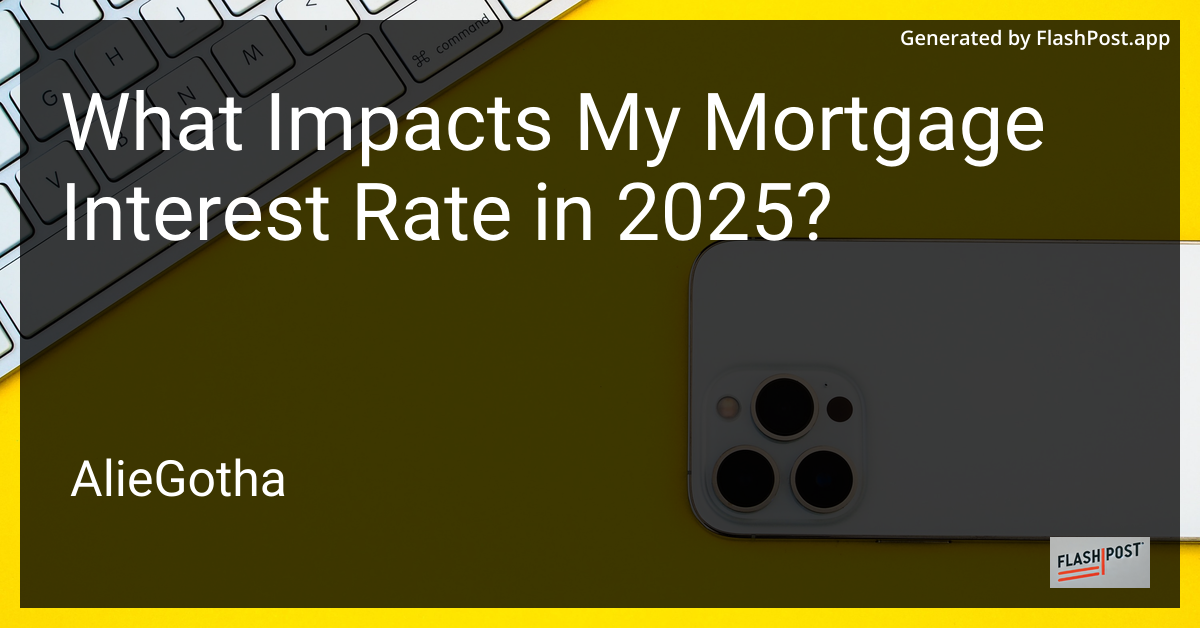

What Impacts My Mortgage Interest Rate in 2025?
As you look forward to the year 2025 and plan to secure a mortgage for your dream home, understanding the factors that influence mortgage interest rates is crucial. These rates can significantly affect your monthly payments and the overall cost of your home loan. In this article, we’ll dive into the key elements that impact mortgage interest rates in 2025.
Economic Indicators
Inflation Rates
Inflation plays a pivotal role in determining mortgage interest rates. When inflation is high, lenders may increase rates to maintain their profit margins, as inflation erodes the purchasing power of money over time. Conversely, low inflation can lead to more favorable interest rates for borrowers.
Federal Reserve Policies
The decisions made by the Federal Reserve are another significant influence on mortgage rates. The Fed sets the federal funds rate, which is the interest rate at which banks lend to one another overnight. Changes in this rate can impact the interest rates on consumer loans, including mortgages.
Employment Trends
Employment levels and wage growth are also essential economic indicators. A robust job market may lead to higher interest rates as demand for mortgages increases, while higher wages might contribute to inflation. Conversely, high unemployment could result in lower rates as the economy seeks to stimulate borrowing and spending.
Personal Financial Factors
Credit Score
Your credit score is a direct reflection of your creditworthiness and greatly affects the interest rate you can secure. Borrowers with higher credit scores typically receive more favorable rates because they pose a lower risk to lenders.
Debt-to-Income Ratio
Lenders assess your debt-to-income (DTI) ratio to evaluate your ability to manage monthly mortgage payments. A lower DTI ratio indicates a stable financial situation, potentially qualifying you for lower interest rates.
Loan Amount and Down Payment
The size of your loan and the amount of your down payment can influence the interest rate offered by lenders. A larger down payment reduces the loan-to-value (LTV) ratio, possibly resulting in better terms and a lower rate.
Market Conditions
Real Estate Trends
Property values and housing market trends in your area can also sway interest rates. High demand for homes might lead to increased rates, as lenders adjust to a competitive market. To explore how regional variations like Alabama’s property values impact your mortgage options, check out this resource.
Global Events
Global economic events, such as political shifts, trade agreements, or pandemics, can also influence mortgage rates. These events can affect the economy’s overall health, thereby impacting interest rates.
Mortgage Product Type
Fixed vs. Adjustable-Rate Mortgages
The type of mortgage you choose matters. Fixed-rate mortgages lock in an interest rate for the life of the loan, offering stability and predictability. In contrast, adjustable-rate mortgages (ARMs) start with a lower rate that can fluctuate over time based on market conditions.
Loan Term
Shorter-term loans typically have lower interest rates compared to longer-term loans. A 15-year mortgage, for example, might offer a lower rate than a 30-year mortgage, though your monthly payments would be higher.
Conclusion
Understanding the array of factors that influence mortgage interest rates in 2025 can empower you to make informed decisions as you embark on the home buying journey. By keeping an eye on economic indicators, maintaining a strong financial profile, and considering the right mortgage product for your situation, you can secure the best possible rate.
For those ready to dive into the mortgage application process, it’s important to get pre-approved to understand your borrowing power. Alternatively, if you’re considering purchasing a home without mortgage financing, explore different strategies to achieve your homeownership goals.
